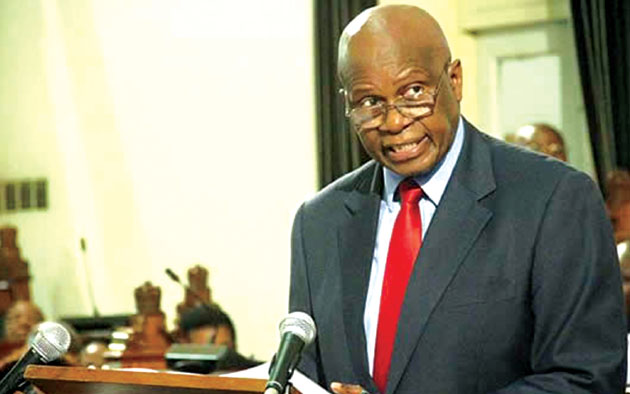
eBusiness Weekly

Kudzanai Sharara
Zimbabwe has an external debt overhang of more than $10 billion while domestic debt is forecast to close the year at approximately $3 billion. The bulk of the external debt is in arrears to institutions such as the African Development Bank, the World Bank and the Paris Club. These institutions cannot extend additional funding to the country until the arrears have been cleared.
With such a debt overhang other institutions of repute will also find it hard to lend to the country, while those that dare to lend will put a huge risk premium, making the funds expensive for a country looking at retooling given the state of its industry — still using antiquated equipment.
Zimbabwe is, however, struggling to free up funds to stimulate its economy to grow after it grew by a marginal 0,70 percent in 2016, lower than the 1,1 percent achieved in 2015.
Approximately 93 percent of its revenues goes to recurrent expenditure, leaving little room for capital projects that are eventually funded by running a budget deficit and issuance of Treasury Bills.
With foreign funders not loosening their purse, the Government has since turned to the local market, funding its projects by borrowing through various instruments with the most notable one being the issuance of Treasury Bills (TBs). While initially this proved like a workable solution, with Government being able to pay back the principal amount plus interest, it is no longer sustainable and Government has since admitted this.
Presenting his 2017 National Budget, Finance Minister Patrick Chinamasa said the continued issuance of TBs pose challenges of capacity for Government to repay on such obligations.
He said the mismatch between revenues and expenditures required that the thrust of Government for the 2017 Budget rationalises expenditures in line with sustainable financing capacity.
When he spoke, Government was still able to service the loans, but struggling to pay the principal amount on maturity.
The situation has since escalated with Government resorting to roll-overs of the principal amount but still paying the interest.
Worryingly though, is that TBs are still being issued with the latest ones being the $200 million worth of TBs given to ZESA to settle debts owed by parastatals and local authorities to the power utility.
The upcoming agricultural season is also likely to see Government funding input supplies by issuing TBs.
This means Government is heavily indebted and cannot afford to borrow anymore in whatever form, domestically or internationally. The question however is how it funds developmental and economic growth programmes. This is where other funding instruments must come into play, most importantly bond instruments.
Nigeria recently raised $3 billion in a two-part international bond sale as it looks to fund a fiscal deficit and reduce its local-currency debt burden.
The offering, its biggest Eurobond issuance ever, is the nation’s third sale in 2017.
Egypt, Morocco and SA among other African countries have been able to raise billions of dollars through issuance of bonds. While Zimbabwe should be following suit, it’s highly unlikely that the bond(s) will find any takers given the country’s debt overhang which it is struggling to service. Investors will thus be sceptical in whether the government will be able to service the bonds.
The other option is for Government or its arms to issue bonds on a project by project basis. IDBZ has proven it several times that there is appetite for such instruments as long as the project is viable.
In the last couple of years, IDBZ has managed to successfully issue infrastructure bonds to finance the refurbishment of Kariba South Power Station and the re-powering of the Harare Power Station among others.
This model, which is done without crowding out the private sector, could have been replicated for the Tokwe Mkosi dam instead of issuing TBs, it can be replicated even for the Robert Mugabe International Airport.
The airport is an income generating entity and should be able to service its debts/bond without much of a strain. In any developed country, local development projects are done locally and almost always funded by issuing bonds.
If a Government and its various arms can show the required competence in running such operations, they can continue to access large capital even from the Diaspora.
We are told arrivals in Victoria Falls have increased quite significantly because of the new airport. This is testimony enough to know what a modernised airport can do in terms of revenue generation.
As a result issuing bonds to fund the modernisation of the Robert Mugabe International Airport should be a better solution than Government resorting to borrowing which has proven to be unsustainable and disastrous to the economy.
The loss of value in bank balances is one good example of what excessive Government borrowing from the domestic market can do to the economy. Here in Zimbabwe it created a damaging gap between money supply and actually cash.
The missing link though was the bond market, where old and yet to be issued bonds can be traded. One thing investors look for before putting money into any form of investment is whether they will be able to exit from the investment once it does not fit into their investment strategy. An exit gateway can also be required even when one has made money or wants to cut losses. So the establishment of a bond market is a welcome development as it provides flexibility to investors in terms of investment period.
The other good thing about using bonds as a fund raising vehicle is that it attracts private capital and in the process alleviate pressure from the fiscus. This should be a much better option than to borrow from the Briton Woods institutions that, in any case, are unlikely to release funds any time soon.



